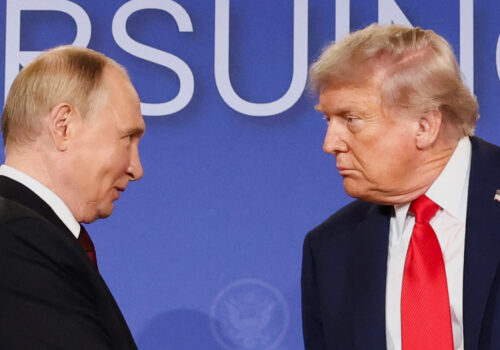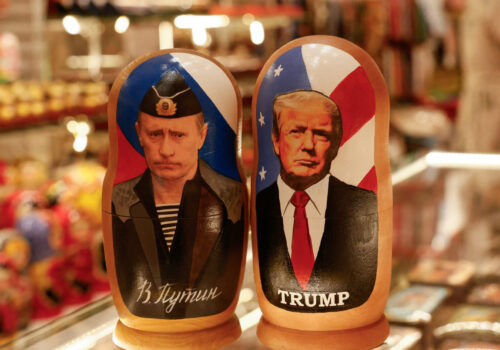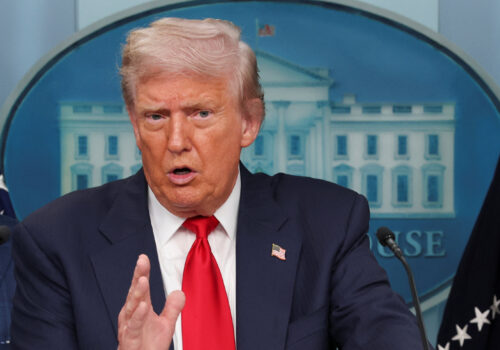Will Europe rise to its strategic moment?
Europe’s strategic moment has arrived—ready or not. That’s underscored by the dramatic, last-minute scheduling of Monday’s White House meeting involving US President Donald Trump and Ukrainian President Volodymyr Zelenskyy, alongside seven other European leaders.
“For the Trump administration, the war in Ukraine is not an occasion for augmenting American power in Europe but for diminishing it, by passing the job of defending Europe back to the Europeans,” wrote Michael Kimmage, a history professor at the Catholic University of America, in the Wall Street Journal this weekend.
The problem in the past has been Europe’s unwillingness politically and militarily to rise to the challenge. With Washington wavering and Moscow menacing, Europe faces a strategic moment—a choice either to assume responsibility for its own defense and security or to remain dangerously dependent on forces beyond its control. What’s in doubt is whether significant increases in European defense spending, and increased common cause among European leaders, can unfold quickly enough to save Ukraine without significant US help, including engaging in a security agreement for Ukraine.
More than anything, that’s what Monday’s meeting in the White House will be about.
The August 15 summit between Trump and Russian President Vladimir Putin in Alaska set off alarm bells across Europe and, of course, in Ukraine. Putin escaped without any consequences, even as his military continued to kill Ukrainian civilians as the meeting unfolded. He came away without agreeing to a cease-fire, without new sanctions against him, and without even a reprimand for the war he ignited. Even worse, a European official told me, Putin is making military gains in Donetsk that could be difficult to reverse.
With a sense of foreboding, European leaders watched Trump in Alaska give their most dangerous adversary a red-carpet welcome and a chummy ride to the summit in his armored limo. Then they watched Putin, in a stunning reverse of the usual protocol for a host country, step to the podium ahead of Trump and deliver—for eight minutes—his version of history, which blames Ukraine for his unprovoked and criminal war.
Secure phone lines were burning on Friday and throughout the weekend among European leaders and Kyiv. The result was a decision to follow up the bilateral Alaska summit with a transatlantic summit of their own at the White House.
Instead of letting Zelenskyy travel alone, his European bodyguard will be made up of European Commission President Ursula von der Leyen, German Chancellor Friedrich Merz, French President Emmanuel Macron, Finnish President Alexander Stubb, Italian Prime Minister Giorgia Meloni, British Prime Minister Keir Starmer, and NATO Secretary General Mark Rutte.
These European heavy hitters are coming to town with heaps of growing concern, but they also want to embrace one promising new avenue. What’s captured their attention is Trump’s newfound willingness to discuss US and European security guarantees for Ukraine. On Sunday, US envoy Steve Witkoff, who was in the meeting with Putin, explained what had changed: “We were able to win the following concession [from Russia]: That the United States could offer Article 5–like protection, which is one of the real reasons why Ukraine wants to be in NATO.”
This momentum toward a security guarantee is, as Witkoff described it, “game-changing.” Without such a guarantee, which requires US involvement, European leaders don’t believe any cease-fire or peace agreement with Putin can be enduring.
“It’s a shift in the US position,” said the senior European official, speaking on the condition of anonymity to discuss sensitive diplomatic issues. “We don’t know what that would look like, but it’s what’s been required for a long time to unlock a durable peace agreement.” What’s unsettling, though, for US allies is the notion that Putin would have a veto over a US security guarantee.
The official underscored an evolving European view that what’s most crucial for Ukraine is to end the war in a manner that protects its sovereignty, ensures its security, and provides it with the freedom to join whatever international organizations it chooses—including the European Union and NATO.
If Ukraine can secure its sovereignty, then concessions on territory grow more palatable. If the United States is willing to provide a security guarantee alongside its European partners, then they will be more willing to provide boots on the ground in Ukraine as a stabilizing force once the war ends.
The European leaders arriving in Washington represent a self-described “Coalition of the Willing,” whose representatives spoke with Trump ahead of his Alaska meeting. What they’ve recognized—particularly given the heterodox foreign policy approach of Trump that I described here—is that if they aren’t at his table, they are on the menu. In other words, if they aren’t actively involved in shaping the conversation directly with him, they are vulnerable to being negatively impacted by his decisions and the influence of others—in particular Putin and those within the Trump administration who remain sympathetic to the Russian leader.
“For over a century, no European peace treaty has been signed without the participation of the United States,” Kimmage noted in his essay. He cited President Woodrow Wilson’s role at the end of World War I, President Harry Truman’s impact on all the post–World War II agreements, and President Bill Clinton’s involvement, with US envoy Richard Holbrooke in the lead, in ending wars in the former Yugoslavia. In all those cases, unlike Ukraine, the US military had either participated directly or demonstrated its preeminence in other ways.
European and transatlantic history is in motion, with the shifting of strategic and security responsibilities from the United States to Europe, an outcome that all parties embrace. If executed properly and with continued US military engagement and security guarantees, then the shift will provide the continent more lasting stability. However, if the shift is executed too abruptly and without sufficient coordination, then Putin will prevail in Ukraine, and Europe will grow less secure. Eighty years of US investment in a freer, more secure, and more prosperous world are at risk.
Frederick Kempe is president and chief executive officer of the Atlantic Council. You can follow him on X: @FredKempe.
This edition is part of Frederick Kempe’s Inflection Points newsletter, a column of dispatches from a world in transition. To receive this newsletter throughout the week, sign up here.
Further reading
Fri, Aug 15, 2025
Experts react: Trump and Putin just left Alaska without a deal. Here’s what that means for Russia’s war on Ukraine.
New Atlanticist By
The US and Russian presidents met in Anchorage for nearly three hours, but the talks did not bring a halt to Russia's ongoing assault on Ukraine.
Thu, Aug 14, 2025
Alaska Summit: Trump wants a real estate deal. Putin wants an empire.
UkraineAlert By Peter Dickinson
US President Donald Trump appears to view peace negotiations with Vladimir Putin as a geopolitical real estate deal. But the Russian dictator is not fighting for land in Ukraine. He is fighting for Ukraine itself, writes Peter Dickinson.
Thu, Aug 14, 2025
When he meets Putin in Alaska, ‘heterodox’ Trump will face his biggest geopolitical test yet
Inflection Points By Frederick Kempe
The outcome of the meeting in Anchorage could have a long-lasting impact on geopolitics, Trump’s legacy, and his Nobel Peace Prize aspirations.
Image: Ukraine President Volodymyr Zelenskyy meets the President of the European Commission, Ursula von der Leyen, in Brussels on Sunday Aug 17, 2025 where European leaders who make up the coalition of the willing are set to hold a conference call on Sunday - ahead of crunch talks between Donald Trump and Ukraine's Volodymyr Zelenskyy next week. (Ukraine Presidential Press Office handout) REUTERS


